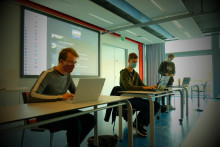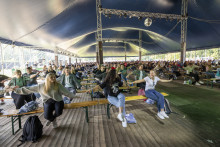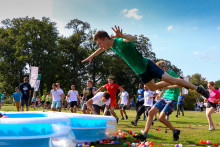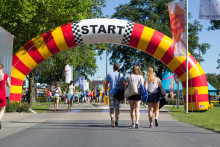The goal of the quick scan was to obtain up-to-date information on student well-being during Covid-19. The information was collected through meetings with student members of programme committees and based on input from study advisors and student psychologists. UT employee Annemarie Arets-Meulman, who was in charge of the project, highlights the main findings.
A big survey of student wellbeing was organized at the UT in summer 2020. Why was there a quick scan done in April?
Arets-Meulman: ‘While a big survey gives you important statistics, this time we really wanted to receive tangible feedback, information the management can use to improve the situation. Numbers are nice, but we wanted to know what specifically needs to be addressed. Furthermore, we noticed that people are tired of surveys, so we decided to find another way. Quick scan is of course not perfect, it is done in a short amount of time with a relatively small number of people, so it is never fully complete. But it allows you to get timely information for the management. The situation is changing so quickly these days. Information we got last year doesn’t help us organize things for this year or next year. Now we have useful input for activities such as the Kick-In.’
As you mentioned, the situation changes very quickly nowadays. It is completely different now than it was in April. Are the results still relevant?
‘Yes, for now they are still valid. They will not have a long life, though, that is true. One of the main findings was that students suffer from the lack of social cohesion. The current students have not developed any social bonds. There is a real need to fix that – for the students who will start next year, but also for those who already started this year. The Kick-in should have more in-person elements – for both of these groups. For the group that started in 2020 community building activities also need to be organized. This is now on the agenda, and so the scan is impactful.’
One of the scan’s main conclusions was that UT students’ wellbeing is generally ‘okay’, correct?
‘Yes, that was astounding for me. I thought most students would tell me that they were drowning, but most of them – not all – showed a lot of resilience. They are coping. They are not doing great, but they are okay. At the time of the scan, so a few months ago, study advisors confirmed that most students were on track and that the overall situation was “OK”. For most programmes the study results and dropout rates were quite similar to previous years. The student psychologists have not experienced a noticeable increase in requests for aid. Given the circumstances, I think we can be relatively happy about all that. UT students did okay in a bad situation.’
Was there a specific group of students that stood out?
‘Yes, generally everyone mentioned that international students and first year students suffered the most. They didn’t get a chance to build a social network. Most international students live on their own. Students who live in a student house were generally doing better.’
Based on the input from the scan, what are the main things the UT should take on board?
‘Social cohesion is definitely the number one. Students were generally grateful for the flexibility of their study programmes and the hybrid education. If we need to continue with hybrid education, some small improvements need to be made though. For example, the communication needs to become clearer. Students would also like to see continued focus on student wellbeing.’
What will the increased focus on student wellbeing look like in practice?
‘There is already a project group SWIP dedicated to the topic. It has been approved as a long-term focus of the university. There will certainly be a follow-up to the quick scan, although maybe in a different form. Students really appreciated the direct contact. We should be talking with them, not about them.’







